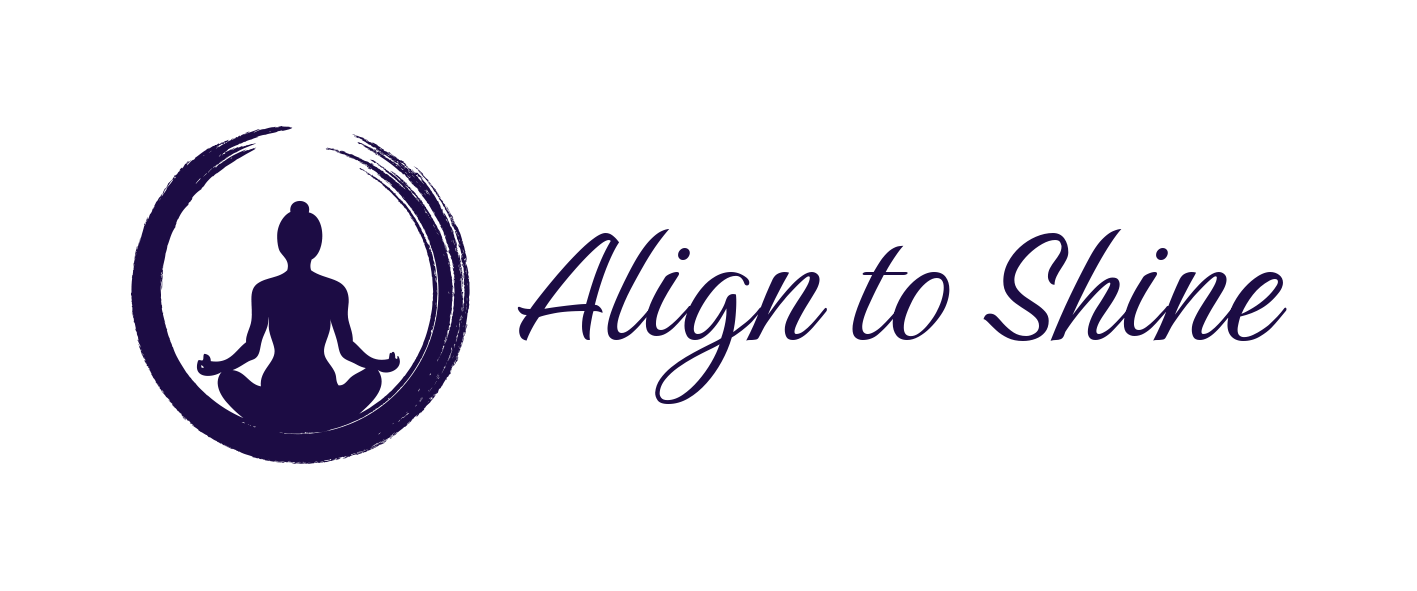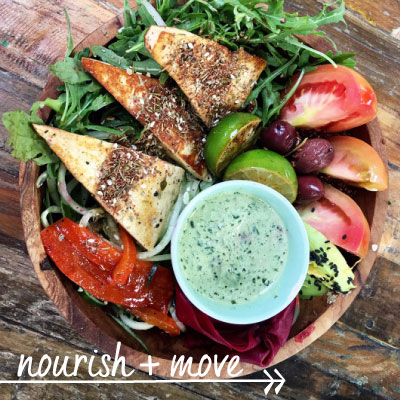
yogalign.co.nz admin
Improve Liver Function
Research suggests that drinking spearmint tea twice daily may improve liver function and support clearing excess testosterone. BePure created this Sparkling Spearmint Iced Tea, a tasty non-alcoholic option to support hormone balance. A glass of this tea is light, refreshing, and best enjoyed with friends.
SPARKLING SPEARMINT ICED TEA

INGREDIENTS
- 1 litre jug
- A large handful of fresh spearmint leaves (organic) or from your garden
- 500mls of boiling filtered water
- 500 mls of sparkling soda water
- Juice of 1 lemon
- Juice of 1 lime
- Ice to serve
INSTRUCTIONS
- Place spearmint leaves in a jar and fill with 500 mls of boiling filtered water.
- Stand for 10 minutes.
- Refrigerate your brew until cold or overnight for best results.
- Once cold fill the rest of your jar with sparkling soda water.
- Add juice of lemon and lime.
- Serve with Ice.
- Enjoy!
The above recipe is compliments of Ben Warren & Team www.bepure.co.nz
A Movement Rich Life
Katy Bowman spoke at the Ancestral Health Symposium in Queenstown, New Zealand October 2017 on Move Your DNA: Movement Ecology & the Difference Between Exercise & Movement
Here are a couple of exerts:
Movement isn't only affecting your arms, legs, and abs; through a process called mechano-transduction, movement influences the behaviour of your cells.
We are currently experiencing unprecedented sedentarism.
There are local effects of movement, as well as systemic.
Within an active body you can have cellular sedentarism ie running with supportive shoes (your feet have restricted movement), having smoothies & juices instead of chewing whole foods (there is minimal movement of the muscles of the jaw, tongue & face).
The key to increasing our personal movement lies in understanding how movement works & expanding our thoughts & actions away from exercise & towards a movement-rich life.
Katy Bowman has a live event this weekend in Wellington, followed by events in Nelson & Auckland before she heads back home to the States. For more details check out Katy's live events at https://nutritiousmovement.pike13.com/categories/64332
- gypset
- yogalign
- gypset life
- mount maunganui
- breath
- posture
- movement
- alignment
- environment
- nourish
- active
- sedentary
- optimal wellness
- self awareness
- self love
- self heal
- nutrition
- empower
- love
- energy
- nature
- abundance
- balance
- truth
- vitality
- dynamic
- cellular energy
- Katy Bowman
- nutritious movement
- movement rich life
Ageing Breakthrough
Ageing Breakthrough
A team led by Professor Lorna Harries, Professor of Molecular Genetics at the University of Exeter, has discovered a new way to rejuvenate older, inactive cells.
Within hours of treatment with compounds called reversatrol analogues, the older cells started to divide and had longer telomeres – the ‘caps’ on the chromosomes which shorten as we age.
The treatment is based on a substance found naturally in red wine, dark chocolate, red grapes and blueberries.
The discovery has the potential to lead to therapies which could help people age better, without experiencing some of the degenerative effects of getting old.
Change Your Posture, Change Your Life Workshop - 2 & 3 December 2017
Come join the creator of YogAlign & FitAlign, Michaelle Edwards for a 2 day workshop "Change Your Posture, Change Your Life" here in Tauranga, New Zealand.
Open to anyone interested in posture education including yoga practitioners & instructors, physical & massage therapists, movement & fitness instructors, chiropractors, acupuncturists, & wellness practitioners.
Michaelle Edward's will be over from Kauai, Hawaii for the 12 hour immersion workshop Sat 2 & Sun 3 Dec, 9am - 4pm (if you can only attend one day please email me for details, thanks Leonie).
Learn the unique YogAlign self-care program with breath based neuromuscular realignment techniques. Create balance, strength & agility using safe, comfortable & functional poses & exercises. Aligned posture, deep core strength, alleviation of chronic pain & anxiety, & an increase in beneficial hormone levels.
This course is suitable for all ages & fitness levels.
Venue: Ohauiti Settlers Hall, 459 Ohauiti Road, RD3, Ohauiti, Tauranga
Cost: NZ$275 (US$200) for the 2 day workshop
For Registration & Payment: www.yogalign.com - Workshops & Retreats
Breathing is an Extraordinary Event!
Breathing is an extraordinary event. Not only does it bring oxygen to your cells, but also gives your organs, endocrine system & inner connective tissue a massage from the inside out with every breath.
YogaAlign's breathing exercises are designed to help you fully awaken, supercharge & recode your breath & posture at the nervous system level.
When you breathe in, try moving the ribs out in all directions as though you are inflating a balloon. As you inhale your outer rib muscles pull the ribs apart as your diaphragm contracts downwards, creating more space in the chest area & allowing the lungs to expand & fill with air.
As you exhale, notice the internal intercostal muscles pulling the ribs back together, while the outer muscles of the abdomen & waist area contract & press the air out.
Take a few moments each day to ground yourself with a few deep breaths, toning, lengthening & strengthening.
Be Your Own Leader
Written by Charlie Ambler 10 November 2016
Photo from Pinterest
“Self-control is the chief element in self-respect, and self-respect is the chief element in courage.” ― Thucydides
Whenever I see people getting so upset about politics, I wonder— do these people truly care about one another or are they using this as an excuse to get upset about how little control they have over their lives? Everywhere I see people with no control, people with terrible habits and ugly beliefs about those who disagree with them. These individuals feel they have no power over their own lives and are pretending that this is because of some big bad ‘evil’ out there. Is it really? Has this mindset of external demonization ever worked for anyone on any side of a political or religious spectrum? No. I think meditation has helped me shift my mindset.
The sky is not falling. You’re not dying any faster than you are on any other day. No one else is in charge of you, and if you are going to waste your energy worrying so much about theoretical possibilities in the external world, you will not have any energy left to direct inward or towards the people you love. You will not grow. You will not learn anything new. You will complain and whine instead of acting. Worst of all, you will live in fear, making you weaker than that which you fear. Life is not fair, nor is it easy. This is why we meditate.
People want so badly not to have to take responsibility for themselves. They want an external enemy to blame. This is a weakness that the meditative mind seeks to overcome. You are wholly responsible for your sense of well-being and your understanding of yourself. You are your own leader. Why can’t we just assume this role? Why must we blame others for our problems? I sincerely believe that this impulse to blame and demonize comes from a place of deep spiritual weakness. To overcome such a simplistic mindset, we have to develop mindfulness.
Over-involvement in abstract politics is, in principle, the same thing as thinking that lots of money will make you happy. Nothing in the external world makes you happy. You make you happy. These external stimuli are arbitrary and interchangeable. And yet people continue to act so stupid. Half of America is happy right now, for example. The other half is furious. Is this not some sort of extremely simple lesson in perspective? It’s not about out there— it’s about you.
If you cannot be satisfied with yourself right now, you will never be satisfied with yourself. And people who do not find contentment within try to force the world to accommodate them. The world owes you nothing. It is full of beauty. It is full of terror. It is overflowing with every energy of every kind. But this is not about you specifically anymore than it is about a tree or a grain of sand. You are merely a brief glimpse of this massive whole. Sit, take a deep breath, and lead yourself towards wisdom rather than ignorant whining.
This is what happens to Your Body & Mind when You stop Meditating

by Amy Williams November 14, 2016. Photo from Pinterest.
Meditation was a gift I gave myself for my birthday four months ago. I started with a simple 10-minute, guided meditation in the mornings, and some days felt so rejuvenated that I finished the day with another, longer meditation.
I found beautiful places in my neighborhood where I could sit comfortably by the water and stare out at nature, completely unburdened by the confines of my home.
I meditated every single day, and my life was changing rapidly for the better. My relationship with myself was easier, my anxiety was more manageable, and my relationships with others were improving every day. My professional life was taking off so rapidly that I really believed I was manifesting abundance and creativity through my daily meditations.
And then I went on vacation and didn't meditate because I didn't need it because my day-to-day anxiety didn't follow me on vacation. So, I took a break.
And then I came home from vacation, and there was laundry to do and bills to pay and work to catch up on, and I convinced myself
I would meditate tomorrow. At the end of two weeks of ignoring my daily meditation practice, I felt terrible inside and out.
My body and mind were craving something as simple as the routine of sitting alone for a few minutes each day, clearing my mind, and meditating. I never would have anticipated how rapidly I would feel the absence of meditation in my life, but after two weeks, here's what happened:
1. I was exhausted.
I wasn't sleeping, and my bedtime routine fell to the wayside. Even if I managed to stay in my bed for eight hours, I was having restless sleep with anxiety dreams that would keep me up. Some nights I would be too tired to even make it to my bed and opt instead to fall asleep on the couch. I started the day tired and ended the day exhausted.
2. My creativity tanked.
I had hoped that a week in the Rocky Mountains would lead to creative breakthroughs in my writing, but returning home only returned
me to the minutiae of everyday life, leaving no room for the creative rebirth I had been anticipating.
3. I said yes too often.
Too often, I made plans on top of plans when I should have been carving out time to meditate and to reengage my self-care routine. Instead, I made plans when I was exhausted and came home only more exhausted and unable to carve out the 10 minutes
I desperately needed to meditate to reset.
4. I stopped eating well.
Takeout and delivery became the norm while I ran around in a constant state of busy. I started using "busy" as an excuse for why I wasn't meditating and watched it morph into an excuse for eating junk.
5. Everything hurt.
My head, my back, and my stomach were all in a knot after two weeks of forgoing meditation. A combination of anxiety, lack of sleep, and a poor diet contributed to the complete dismantling of my physical health in real time.
The next time I catch myself thinking meditation can wait until tomorrow, I'll try to recall how quickly I felt the effects of slipping out of the routine. The good news is, meditation is always waiting right where you left it, allowing you to hit the reset button on the damage done.
4 Questions to consider before reaching Menopause
4 Questions Every Woman Needs To Ask Her OB/GYN — Before Reaching Menopause
by Dr Mary Jane Minkin November 4, 2016
As an OB/GYN, I hear all kinds of issues from my patients—from painful intercourse to vaginal discomfort—especially when there are questions about the way the female body ages and what to expect. Having practiced as a gynecologist for over 40 years, I've heard and seen it all.
And the more open our society has become, the more comfortable my patients have become asking me personal and important questions about the changes in their bodies over time. On the other hand, I still find myself surprised by how many women feel uncomfortable talking about these topics.
Many women are ill at ease discussing the physical changes they'll undergo, specifically after menopause, for reasons we can all relate to: They're embarrassed or feel that their health care provider, or partner, or close friends may not understand.
But let me remind you how normal and important it is to discuss anything you might be struggling with. You're not alone, and there's no need to suffer in silence.
I want to shed light on some of the most common concerns and questions my postmenopausal patients have asked me and will provide recommendations for approaching your health care provider to start this seemingly tough but important conversation.
1. Is any stage of menopause related to loss of libido?
Often my patients will note that they have been experiencing a low sex drive. As I continue the conversation I often learn they are actually experiencing painful intercourse due to vaginal dryness.
Women may feel embarrassed and avoid talking with their partners about vaginal dryness, and rather than bring up the uncomfortable topic, avoid intimacy altogether. While each patient will require a unique treatment based on their medical history and symptoms, once a patient is in treatment, these uncomfortable urinary or vaginal symptoms may be relieved.
2. Is vaginal dryness a normal symptom of postmenopause?
Yes, up to 40 percent of postmenopausal women experience vaginal atrophy, and painful intercourse is a common symptom. While most women are familiar with and talk about hot flashes and night sweats, fewer women are aware of these vaginal symptoms or may not connect them to a treatable, medical condition called postmenopausal vaginal atrophy. Postmenopausal vaginal atrophy is caused by lack of estrogen, which can lead to atrophy, or thinning of tissue, of the vagina and lower urinary tract.
Symptoms may include vaginal burning, itching, and dryness. Other symptoms include urinary symptoms such as urinary urgency and painful urination. There are a number of FDA-approved treatments currently available including a ring, vaginal tablet, pill, and topical cream or gel. It's important to work with your health care provider to find a treatment option that's right for you.
3. Why doesn't my health care provider bring up menopausal symptoms during my visit?
There are a number of reasons health care providers may not bring up menopausal symptoms during your annual visit, and I can't stress enough—you are not alone. There's generally a checklist of items health care providers are interested in learning about during any average annual visit—all of which they need to address in a short amount of time—allowing important topics such as sex during and postmenopause to slip to the back burner as the checkup and medical history usually take priority. On top of that, patients may not be aware that symptoms such as painful intercourse and vaginal dryness are part of a treatable medical condition.
A recent survey of women who experienced vaginal dryness showed that only 7 percent of women had health care providers who actively inquired about postmenopausal vaginal atrophy symptoms. That is just not enough!
4. How can I initiate a conversation about postmenopausal symptoms and my sex life?
The best way to ensure you are getting what you need from your health care provider is to step up to the plate and start the conversation. Come prepared to your appointment with questions or topics that have caused a concern for you. By having your questions written down, you may feel more at ease, and if you are still nervous about discussing the symptoms or your sex life with your health care provider, bring a partner or close friend who may help you feel more comfortable during this conversation.
As the conversation progresses, if your health care provider seems a bit distracted or if there is not enough time to discuss everything you'd like, feel empowered to make a separate appointment to specifically discuss the menopausal changes you may be going through. You can find additional resources to help guide your conversation by visiting talkchange.com.
Of course, it's important to note that not every patient–health care provider relationship is perfect. If you feel that your health care provider may not be the right fit for you, I encourage you to find a menopause specialist at the North American Menopause Society (NAMS)'s official website, where you can search for a NAMS-Certified Menopause Practitioner (NCMP) in your area. When you find a health care provider that is right for you, phrases such as "painful intercourse" and "vaginal discomfort" should be open, comfortable topics. And that's something to celebrate!
photo - Pinterest
Clear All the Toxic Energy in Your Life
7 Ways Feng Shui Can Clear All The Toxic Energy In Your Life
by Dana Claudat October 31, 2016
We love costumes, candy, and pumpkin-carving as much as ever. But we also know there’s a whole other side to Halloween—a world of spiritual significance to tap into. So, for the past week, we’ve been sharing content aimed at helping you connect with your transcendent potential and more effectively creating the life you want, from the inside out. In other words, to manifest magic.
Today, we’re exploring how to use feng shui principles to cleanse your life of negative, ghostly energy and welcome great vibes.
Everything—from the ground under your feet to the electronic device you're reading this on—is energy.
At the core of all feng shui and Eastern (and now, most Western) traditions of healing, energy is everything. Stagnant, stuck energy contributes to blockage and illness while open, flowing energy is the basis of great moods and every kind of abundance.
If you've ever been to a chiropractor or a healer who practices kinesiology, you've likely experienced "muscle testing"—a diagnostic technique where you hold out one arm parallel to the ground and attempt to keep it strong while a practitioner applies light pressure to it. If you're holding an object with energy that your body likes, maybe your favorite fruit, in one hand, your arm will likely stay strong when that pressure is applied. But if you were to hold, say, a bowl of sugar or something you're allergic to in place of that piece of fruit, your arm might get very, unexplainably weak when pressure is applied.
When you clear the negativity and stress from your space, you free up stagnant energy and open up the flow of strong, affirmative, creative greatness.
While I don't make major medical decisions using this method, it's a great physical demonstration of how our energy is affected by the energy of everything around us. To paraphrase Dr. Bruce Lipton, the pioneering cellular biologist whose studies of cells revealed that our lifestyle and beliefs affect our thriving well-being: "Good vibes make you strong, and bad vibes make you weak."
It makes sense, then, that when you clear the negativity and stress from your space, you free up stagnant energy and open up the flow of strong, affirmative, creative greatness. Here's how to get started:
1. Get up and outside early in the day.
Sunshine invites massive doses of happiness, and the more time you can spend connected to nature and out in the sunlight, the better you'll feel. Even if it's overcast, you can connect to this light with a sun-simulating light box and lots of houseplants.
2. Keep things colorful.
If your desk feels drab, a package of rainbow colored pens or Sharpies can be enough to brighten it up. Pops of colors that you love help to add more energy that's in sync with your body and life.
3. Open windows.
It's so important to open your windows daily—even if just for a few minutes. Fresh air will revitalize your space and get the flow going.
4. Reinforce the good stuff in your life in actions.
Saying affirmations out loud is always helpful, but taking action is what really creates radical energy shifts. You can remind yourself that you are a talented, ingenious artist throughout the day, but it's the practice of making art that is really going to rocket your life higher. Making a gratitude list is a great start, but actually sending thank you notes or expressing gratitude directly to people takes it to the next level.
5. Remove all the bad memories.
When you're feeling brighter and lighter, it's easier to look at bad-memory objects (think clothes that lower your self-esteem or trinkets from a relationship that's past) with an objective eye—and let them go. All the stuff you keep close to you that makes you feel bad is actually making you weaker in many ways, and you definitely don't need to be held down by anything in your home.
6. Disentangle toxic ties.
The most effective way to clear your energy is to keep your life free of anyone and anything that drains you, squashes your spirit, or is in any way harmful. If you're feeling roller coasters of turmoil, take the time you need to declutter these toxic ties. It will benefit you in every way imaginable to take responsibility and clear this space in your life.
7. Aim for love every day.
Grudges and resentments keep you stuck and stagnant while love transforms life in expansive ways. So tell people you love them. Find things to love in even the more mundane tasks. Look for love for the people who've wronged you. Love is open and flowing and light.
Good vibes are your superpower. Surround yourself with the sights, sounds, scents, people, pets, art, and actions that light you, and you'll have endless inspiration to create a life filled with ease and positivity.
photos - pinterest
Start your morning well to maintain your Energy
Tune Into Your Circadian Rhythm + Make The Most Of Your Morning Routine
by Soizic June Hagege
October 28, 2016
Almost everyone has heard of detoxifying, but most of us don't really know how it works. Contrary to popular belief, detoxing your body isn't complicated and doesn't require you to go on an expensive raw juice retreat—it happens naturally in your body, every day.
According to circadian circles, morning time is the perfect moment to help your body get rid of toxins. These few steps we've gathered for you will help you have energy all day and go back to a state of well-being and bliss.
1. Tongue scraping
Tongue scraping is a practice from ancient Ayurvedic rituals that consists of removing (literally scraping) bacteria and toxins from the surface of the tongue. It is usually performed in the morning since our digestive system spends the night removing toxins by moving them to the tongue.
Removing these toxins first thing in the morning helps us avoid swallowing them back into our system, which in turn prevents digestive issues. Tongue scraping is said to be more efficient than brushing your teeth since most of the toxins in our mouth are located on our tongue.
Scraping your tongue, albeit unusual, is easy and quick making it a great way to ensure that you start the day with a detoxified digestive system and increased immunity.
2. Oil pulling
This practice, which also comes from Ayurveda, has gotten attention in the media for its numerous benefits. Swishing coconut or sesame oil in your mouth for 10 or 15 minutes in the morning on an empty stomach improves not only oral health but also overall health. It is said to help draw toxins out of the whole body.
You can add a drop of tea tree essential oil in the oil you use to further benefits. Once you are done, make sure to spit the oil—don't swallow any! (Pro tip: Spit it into the trash can, as it can clog drains.)
3. Warm water
The morning is all about replenishing your body with liquids. Did you know that drinking warm water on an empty stomach is said to increase metabolism? Drinking water in the morning stimulates your digestive-colic reflex, which will help you eliminate what is sitting in your intestines from the day before.
For bonus points, you can also add a few slices of lemon in your water, or even lemon and honey, especially if you can get them from a local farmers market.
4. Morning smoothie
A smoothie is one of our all-time favorite recipes to start the day. It's a great way to ensure you get everything you need, from healthy fats to greens.
Starting your day with a liquid meal is also a good way to avoid the "food coma" feeling and bloating. Less energy will go toward digestion than with a heavier meal, leaving you feeling lighter and more energetic throughout the day.
These four steps will help you start feeling better quickly, especially if you've had bloating or digestive issues. Even if you try a different step four days of the week, taking time to nourish your body is an essential step to be able to be present and energized throughout your day.
Contact Leonie Main
m: +64 (0) 274 96 96 33
19B Golf Road, Mount Maunganui 3116, New Zealand
Facebook: Gypset Life












